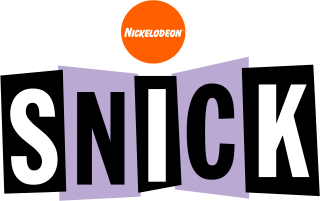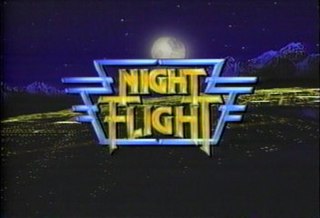
The Movie Channel (TMC) is an American premium television network owned by Showtime Networks, a subsidiary of Paramount Global operated through its Paramount Media Networks division. The network's programming mainly features first-run theatrically released and independently produced motion pictures, and during promotional breaks between films, special behind-the-scenes features and movie trivia.

Nick at Nite is an American nighttime programming block on Nickelodeon. The block's programming broadcasts from prime time to late night, with the airtime varying depending on the night. The block initially consisted of syndicated sitcoms and films from the 1950s to the 1970s. Nick at Nite gradually shifted its programming to primarily airing sitcoms as recent as the mid-1990s to the 2010s. The block was launched on July 1, 1985, and it replaced A&E on Nickelodeon's channel space after it spun off into its own 24-hour channel. The block launched present-day TV Land in 1996. The Nickelodeon Group, a division of Paramount Global's networks unit, generally regards Nick at Nite as a separate channel that shares space with Nickelodeon on the channel due to the block targeting adult audiences. Nielsen has reported Nick at Nite ratings separately from Nickelodeon since 2004.

TGIF was an American prime time television programming block that has aired on ABC at various points since the late 1980s. The name comes from the initials of the popular phrase "Thank God It's Friday"; however, the stars of the lineup touted the initialism as meaning "Thank Goodness It's Funny." In its various incarnations, the block mainly featured situation comedies aimed at a family audience, and served as a lead-in to the long-running newsmagazine 20/20.

120 Minutes is a television program in the United States dedicated to the alternative music genre, that originally aired on MTV from 1986 to 2000, and then aired on MTV's associate channel MTV2 from 2001 to 2003.
Late night television is the general term for television programs produced for broadcast during the late evening and overnight hours—most commonly shown after, if not in competition with, local late-evening newscasts; programs that have been showcased in the daypart historically encompassed a particular genre of programming that falls somewhere between a variety show and a talk show. Late-night shows predominantly cater to night owls, people suffering from insomnia, shift workers with irregular schedule assignments, younger male audiences and college students, along with spillover audiences through viewers of entertainment and news programs aired earlier in the evening.
USA Up All Night is an American cable television series that aired weekly on Friday and Saturday nights on the USA Network. The show aired from 1989 to 1998. Throughout its run, the program was hosted by Gilbert Gottfried, Caroline Schlitt, and finally Rhonda Shear.

SNICK was a two-hour programming block on the American cable television network Nickelodeon, geared toward preteen and teen audiences, older than the target audiences of most Nickelodeon programming. It ran from August 15, 1992, until January 29, 2005 and was aired on Saturdays starting at 8 p.m and ending at 10 p.m. ET, with a replay on Sundays from 5 p.m. to 7 p.m. In 2005, SNICK was revamped as the Saturday night edition of TEENick. Nickelodeon continued to run a Saturday night programming block until 2021, though since the TEENick name was removed from the lineup in February 2009, the block no longer went by any name.

Night Flight is an online visual-arts magazine and variety television show that originated on cable TV network USA Network. It originally aired from 1981 to 1988 before moving to syndication in the early 1990s. The show relaunched online on nightflight.com in 2015 with original episodes that can be streamed on the subscription channel Night Flight Plus. In April 2018, it returned to cable television as a short form (15-minute) program airing late Friday nights/early Saturday mornings on the network IFC. It includes a mix of mainstream and alternative music videos, artist interviews, B movies, documentaries, short films, stand-up comedy and animation.

WCW Saturday Night is an American weekly Saturday night television show on TBS that was produced by World Championship Wrestling (WCW). Launched in 1971 initially by Georgia Championship Wrestling, the program existed through various incarnations under different names before becoming WCW Saturday Night in 1992. Although initially the anchor show of the Turner Broadcasting-backed wrestling company, the September 1995 premiere of WCW Monday Nitro airing on sister station TNT usurped the show's once preeminent position in the company, as the primary source of storyline development and pay-per-view buildup.

WPCH-TV, branded as Peachtree TV, is a television station in Atlanta, Georgia, United States, affiliated with The CW. It is owned by locally based Gray Media alongside CBS affiliate and company flagship WANF, and low-power, Class A Telemundo affiliate WKTB-CD. WPCH-TV and WANF share studios on 14th Street Northwest in Atlanta's Home Park neighborhood; WPCH-TV's transmitter is located in the Woodland Hills section of northeastern Atlanta.

Friday Night Videos is an American music video/variety program that aired from July 29, 1983, to May 24, 2002, on NBC. Originally developed as an attempt by the network to capitalize on the emerging popularity of music videos, which had been brought into the mainstream by MTV during the early 1980s, the program shifted over to a general music focus in 1990, mixing in live music performances alongside the video showcases. Upon being retitled Friday Night in 1994, its format was expanded to incorporate a variety of entertainment content to supplement, and eventually surpass, the music videos. The program evolved into its final format in 2001 under the title Late Friday, removing the music and feature segments and becoming dedicated solely to showcasing new stand-up comedy talent.

In American professional wrestling, the term Black Saturday refers to Saturday, July 14, 1984, the day when Vince McMahon's World Wrestling Federation took over the timeslot on Superstation WTBS that had been home to Georgia Championship Wrestling (GCW) and its flagship weekly program, World Championship Wrestling, for twelve years. McMahon's purchase led to a longstanding rivalry between himself and WTBS owner Ted Turner, who later bought GCW's successor on the network Jim Crockett Promotions (JCP) and formed his own company under the World Championship Wrestling (WCW) name.
Night Network, Night Time and Night Shift were names given to the overnight schedule of the ITV network in the United Kingdom. The first ITV company began 24-hour broadcasting in 1986, with all of the companies broadcasting through the night by the end of 1988. At first, individual companies created their own services; however, before too long, many of the smaller ITV stations began simulcasting or networking services from others.
Saturday morning preview specials were aired on television annually to present previews of each network's fall lineup of Saturday-morning cartoon children's programming. Similar to the model for their new prime time counterpart shows, television networks in the United States and Canada would film a preview special for the fall season. These would often air as part of the regular network schedule or be made available to their affiliates for airing at any time, especially to fill timeslots that contained programming canceled months before.
William "Bill" John Tush, III is an American news journalist and humorist. In high school, Tush showed an early interest in broadcast performance and started working in radio professionally while a Junior in High school. Tush went to work in Atlanta, Georgia for Ted Turner, first as an announcer, later developing Tush, a comedy show broadcast on Turner's WTBS SuperStation.
TNT Sports has occasionally televised college football games on its networks since 1982; that year, under an agreement with the NCAA, TBS became the first broadcaster to nationally televise college football on cable. After the NCAA broadcasting package was dismantled in 1984 following a Supreme Court ruling, TBS would broadcast SEC football from 1984 to 1992, along with selected bowl games through 2000.
In regard to children's programming, the American Broadcasting Company (ABC) has aired mostly programming from Walt Disney Television or other producers. This article outlines the history of children's television programming on ABC including the various blocks and notable programs that have aired throughout the television network's history.
TBS and TNT, the first two cable television networks in the Turner Broadcasting System, aired children's programming for a period of over 20 years, beginning in the 1970s and continuing through 1998.










